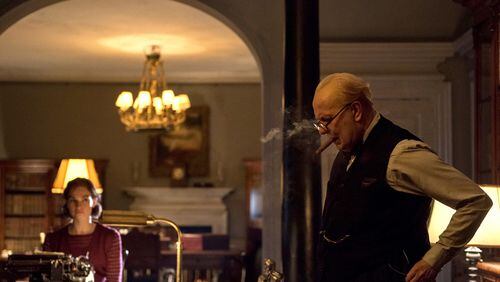Words, in the new movie “Darkest Hour,” are weapons.
Set roughly during the same time period as “Dunkirk,” between May and June 1940, the World War II drama takes place not on the beaches of northern France, where hundreds of Allied soldiers were cornered by German troops, but in the backrooms of England’s war cabinet. It is there that the newly installed prime minister, Winston Churchill (played by Gary Oldman), struggles with how to rally Parliament and the British people for the coming Battle of Britain.
Oldman, who underwent a remarkable metamorphosis to play the iconic politician, is a front-runner for a best actor Oscar nomination. While in Washington, D.C., recently for a preview screening of the new film, the 59-year-old British actor sat down with director Joe Wright, 45, to talk about the historical film’s surprisingly contemporary resonance.
Q: Gary, you're known for playing characters with the gift of gab. How does this role continue that tradition?
Oldman: One of the themes of the film was to show Churchill as a writer. Nowadays, it is somewhat unusual for anyone to write their own speeches. The genesis of the project was that (screenwriter) Anthony (McCarten) had this book on his shelf for many years, and he went to it one day, and it was one of those anthologies of the greatest speeches in the English language. Three of them, he discovered, were by Churchill, written in the space of four weeks.
Q: Joe, how did Churchill harness the power of words?
Wright: He generally used Anglo-Saxon words. They're shorter, more muscular, not particularly flowery or intellectual. But they hold great intellectual weight. These extraordinary blunt and vital words are so much a part of the British psyche.
Q: You've spoken of film as a balance between dialogue and visuals. This movie shifts that balance markedly. Why?
Wright: I've made some films that were very much image based: "Anna Karenina" and "Pan," for instance. Here, I wanted to engage with the purest drama. It's interesting that both Chris Nolan and I seem to be interested in a return to a minimalist aesthetic.
Q: The scene in which Churchill goes into the London Underground to assess the mood of the populace — it's cinematic, but it never happened, did it?
Wright: No. He famously would go and talk to Londoners and meet them at their houses, especially during and after the Blitz. He would get quite dewy-eyed and have a little cry with them. One of the main narrative arcs for me in the film is the connection between Winston and the public. At the start of the film, as we see him driving through London, he is completely disconnected. Over the course of the movie, he comes into an intense union with the public, to the point where he is then able to speak their hearts.
Q: Gary, much has been written about your physical and vocal transformation for this role. Did the prosthetic makeup and fat suit you had to wear help you to find the character, or were they a pain?
Oldman: They were far from a pain. First of all, you know what you're getting into. You have to surrender to shaving your head every morning. This was the year of surrendering to Winston. We had four weeks of rehearsal, on top of 50 days of shooting, which is unheard of. But before all of that happens, you work in isolation. I call it "kitchen acting." The countertop in the kitchen is higher than the table, and I like to put the script on it, and I glance down, walk around the house, come back, make a cup of tea. What I'm looking for is a physical sensation. I'm trying to find (imitating Churchill's lisping voice and pouting lower lip) that sound in my mouth. When everything was put together and I looked in the mirror after many makeup tests and we felt that we'd got him, I suddenly realized that I didn't have to do so much with the lip, because the makeup was doing it for me.
Q: Is "Darkest Hour" ultimately a war story, a political story or a personal story?
Wright: For me, everything else serves the personal. Yes, I find the history interesting — and, dare I say, educational — but what I really wanted to tell was a story about a character who doesn't fit in.
About the Author






